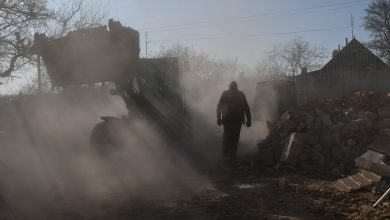Ukrainian Official Outlines Intentional Ambiguity on Strikes Inside Russia

KYIV, Ukraine — A fuel depot in Russia burst into flames, moments after surveillance video captured the bright streaks of rockets fired from low-flying helicopters. A fire broke out at a military research institute near Moscow. Additional fuel tanks have exploded.
These and other similar attacks in Russia have been some of the most intriguing, and opaque, military developments in the last month of the war. If carried out by Ukraine, they represent acts of once nearly unimaginable audacity; one of them prompted the first air raid siren on Russian soil since World War II.
Russia has accused Ukraine of carrying out the helicopter strike and military analysts have suggested that Ukrainian sabotage is very likely responsible for the other fires. Ukraine, for its part, has made no official admissions but instead has winked at the possibility of its involvement, with one official suggesting the fires were just Russia’s bad “karma.”
Now, a senior Ukrainian official has described in the clearest terms yet his government’s policy on strikes inside Russia, calling it one of strategic ambiguity.
“We don’t confirm, and we don’t deny,” said the official, Oleksei Arestovych, an adviser to President Volodymyr Zelensky’s chief of staff.
Mr. Arestovych, in an interview, compared the approach to Israel’s longstanding policy of ambiguity on nuclear arms, another issue of extraordinary geopolitical sensitivity.
“After what has been happening, officially we don’t say yes and we don’t say no, just like Israel,” he said.
Any escalation of attacks on Russia by Ukraine could have far-reaching implications, perhaps influencing public opinion about the war in Russia, or inflaming the Kremlin to the point of escalating its own strikes.
If Western weaponry were deployed in striking Russia, it would fuel Russian propaganda that blames the West for the war and enhance the possibility that the conflict could spill past Russia and Ukraine’s borders.
The fires at Russian military sites, beginning with the April 1 helicopter assault on the fuel depot in Belgorod, about 15 miles from the Ukrainian border, have injected a new element into the military equation of the war. They raise the possibility that Russia, after weeks of inflicting devastating damage in Ukraine, might start to suffer losses on its own land.
The strikes come in two forms: the clear military attack with low-flying helicopters near the border, and sabotage deeper inside Russia.
Russian and Ukrainian media reports have attributed a dozen or so blazes to strikes or sabotage. In addition to the helicopter strike there have been at least three other fires at military sites that seem suspicious and which military analysts have said they were very likely set intentionally.
And while some fires point clearly to an assault or an act of sabotage — such as the two fires that broke out in quick succession at fuel tanks in Bryansk on April 25 — others have remained inscrutable, with neither Russia nor Ukraine suggesting a relation to the war.
The incidents have stirred debate over whether a wider set of targets in Russia may drive home to the Russian people that the war, seen for now only on television and filtered through state propaganda, has a cost at home.
Alternatively, the fires and explosions might cause Russians to rally around the flag in ways damaging to Ukraine, such as in building support for a general mobilization in Russia. That would enable the Kremlin to dispatch more soldiers to the battlefields, despite heavy losses so far.
Ukrainian officials, for their part, have hinted at their involvement with dark humor
A deputy interior minister, Anton Gerashchenko, posted on Twitter a “no smoking” sign beside a picture of the fuel depots in Bryansk engulfed in flame.
Kyiv has also signaled that any counterattacks in Russia are simply part of a war Russia started, and asked, perhaps fatalistically, what more could Russia do to Ukraine? After all, the Russian army is already engaged in a full-scale assault.
“If you decided to attack another country, commit mass murder, crush peaceful people with tanks, and to support murder using warehouses in your region, then sooner or later the time will come to repay that debt,” said Mykhailo Podolyak, a negotiator for President Volodymyr Zelesnky. “So, the disarmament of the killers’ warehouses in Belgorod and Voronezh regions is just a completely wholesome, natural process. Karma is a harsh thing.”
Mr. Arestovych’s comment on Ukrainian policy was the most forthright so far laying out the Ukrainian government’s position of ambiguity, even as officials in Kyiv have been openly suggesting Russians should expect a continuing spat of mysterious fires.
So far, Ukraine has received public support from Britain for directly attacking Russia, with James Heappey, an official in the Foreign Secretary’s Office, saying the strikes were “completely legitimate” given the role of fuel and ammunition depots in Russia’s invasion of Ukraine. Mr. Heappey also endorsed the use of British-supplied weaponry, saying its use to strike inside Russia was “not necessarily a problem.”
The Russian military, which has been firing missiles and artillery at Ukrainian cities and military targets including fuel depots, continuously for two months now, warned on April 13 against Ukraine striking back.
The ministry spokesman, Igor Konashenkov, told Russian news agencies that Russia would respond by targeting the Ukrainian leadership. “We see efforts at diversions and strikes by the Ukrainian military at objects in the Russian Federation,” he said. “If these instances continue, the Russian army will target decision making centers, including in Kyiv.”
Three major fires inside Russia followed that warning, including near Moscow, at a military research institute in the city of Tver.
In the Ukrainian military, the arson fires and helicopter assault into Russian territory have also served the purpose of lifting morale. Having seen the effectiveness of their small unit tactics against the Russian army in the battle for Kyiv in March, midlevel Ukrainian commanders have suggested continuing this strategy inside Russia.
“It will not end until we bring the war to Russia,” said the commander of a Ukrainian brigade, who asked that he be identified only by his nickname, Akula, because he was not authorized to speak publicly.
“It’s not a secret that the Russian people support the war, that it is not just Putin and the rest of the Russians are peaceful,” he said.
“We need to make Russian society fear” attacks on their own country to shift perceptions, he said. “They need to send people like me to Russia.”





